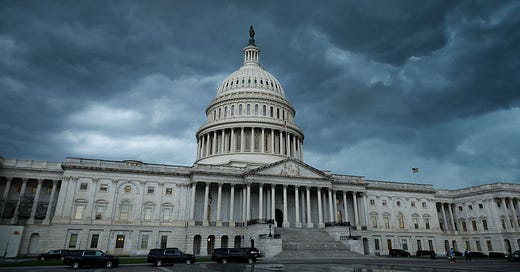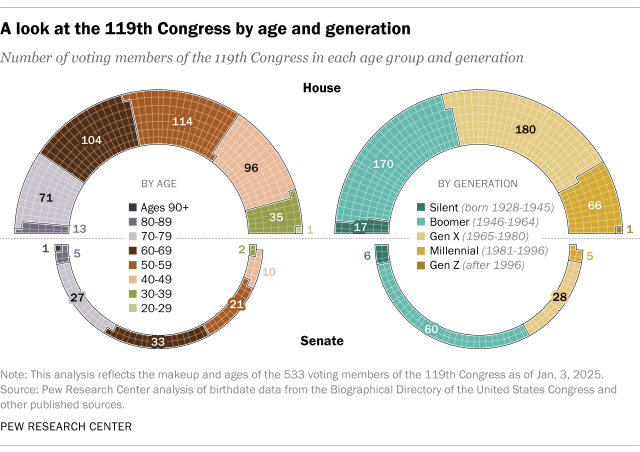Last Thursday, the Republican-controlled House of Representatives narrowly passed the joint budget resolution, teeing up a massive reconciliation package in the coming weeks. The budget extends the 2017 Trump tax cuts and authorizes another $1.5 trillion in additional tax cuts. All in all, this version could add a staggering $7 trillion to the national debt over the next ten years. No matter your thoughts on its merits, this was a big vote—and a big win for the GOP’s narrow House majority.
This was also a vote that would have failed if House Democrats were at full strength. The resolution received 216 votes in favor and 214 votes against, including a pair of GOP nays from Thomas Massie and Victoria Spartz. Three reliable—and potentially decisive—blue votes were conspicuously absent.
New Jersey’s Donald Norcross, aged 66, is currently hospitalized after an emergency medical event last week (thankfully the congressman is in stable condition and expects to make a full recovery). Texas’s Sylvester Turner, aged 70, died in early March just 60 days after beginning his first term in Congress. His deep-blue Houston district will remain vacant until at least November. Arizona’s Raul Grijalva, aged 77, also passed away in March after a long battle with cancer. His seat, a Democratic stronghold, will be empty until September.
The deaths of Turner and Grijalva were tragic. Both men dedicated their lives to improving their communities and this country. Yet even as we remember their service, it’s worth asking whether the pair should have sought (re)election this past fall.
Grijalva first announced his cancer diagnosis on April 2, 2024, but nevertheless continued to seek an eleventh term in office. Arizonans worried about his ability to effectively represent them for another two years were left with little recourse: Grijalva strategically made the announcement one day after Arizona’s April 1st filing deadline.
The story of Texas’s 18th district is even stranger. Sheila Jackson Lee had represented Downtown Houston since 1994. In the spring of 2023, after nearly thirty years in office, Jackson Lee decided to run for Mayor of Houston—the cherry on top of a long career of public service. Then 73 years old, her time schlepping back and forth to Washington was over.
But after a surprise loss in the Democratic primary, Jackson Lee backtracked and filed for reelection in her U.S. House seat. Several months later, shortly after winning another term, she sadly passed away. The seat remained empty from July through November, when Sylvester Turner won the election to replace her. After Turner’s death on March 5th, the seat is now vacant once again. National considerations aside, this is a disastrous outcome for inner-city Houston. In the sixteen months between July 2024 and November 2025, Houston residents will be without representation in the U.S. House for twelve of them.
Illnesses and accidents, of course, are unavoidable. There are times when representatives will have to miss votes. And many legislators do continue to execute capably as they age. Nancy Pelosi, for example, effectively managed a narrow House majority while in her early 80s, not to mention her behind-the-scenes maneuvering to push fellow octogenarian Joe Biden from the presidential race this past summer.
But Pelosi’s case is more exception than rule. Dianne Feinstein’s very public deterioration in 2023 is just one of many sad examples. Last year, for instance, 81-year-old Texas Rep. Kay Granger missed months of votes before it was revealed she was living in an assisted-living facility receiving treatment for dementia.
And these are just the cases that play out publicly.
In an interview with Politico earlier this year, Connecticut Rep. Jim Himes revealed “there’s no question that somewhere between six and a dozen of my colleagues are at a point where they’re…I think they don’t have the faculties to do their job.” North Dakota Senator Kevin Cramer was equally blunt: “I’ve watched some of these members and I think, ‘Why? Why do you want to be here?’ I just turned 64. If I die in the Senate, it’ll be because a bus hit me on Constitution Avenue.”
It’s not only those on Capitol Hill who recognize the problems of a gerontocracy. If anything, Congress lags behind the American people on the issue. Surveys routinely showed, for example, that voters felt Joe Biden’s age was an important issue even while elected officials remained in lockstep with the administration.
Pew data from 2023 found that 76 percent of Democrats and 82 percent of Republicans favored a maximum age limit for elected officials in Washington—a percentage that has almost certainly grown in the wake of the 2024 campaign. In an era where it’s hard to get Americans to agree on anything, an overwhelming and bipartisan majority favor age limits. Even older adults are on board. When asked about the ideal age for a president, just 5 percent of Americans over 70 said it is best for a president to be in their 70s.
Voters are starting to take action. In June of last year, North Dakotans overwhelmingly passed a ballot measure to bar people from running for House or Senate if they will turn 81 during their term (perhaps a dig at Biden, who was 81 at the time). The measure is viewed by many experts as a test case to see if the Supreme Court would consider revisiting its 1995 precedent U.S. Term Limits, Inc. v. Thornton, which prohibited states from imposing candidate qualifications stricter than those in the Constitution.
Barring a surprise reversal, however, a constitutional amendment may be the required avenue for reform. Prospects are unfortunately incredibly slim. In addition to the usual high thresholds for an amendment, an age-limit proposal would require members of Congress to vote to end their own political careers. Say the amendment capped careers at 70. In the current Congress, 84 representatives and 33 Senators are at least 70. Many others will break that mark during their current term. Even the most earnest believers in our legislative branch would not expect representatives to vote so clearly against their own self-interest.
While the gerontocracy hurts both parties, it’s Democrats who have been hit hardest in recent years. First, the obvious: Joe Biden’s age cost the party dearly in the presidential election. But the recent pair of vacancies in Texas and Arizona will also have a huge impact over the next six months. As we saw with the budget vote on Thursday, Mike Johnson and GOP leadership are afforded much-needed breathing room with Democrats down two seats—not to mention the 1.5 million Americans left without adequate representation in Washington.
And the problems run deeper than the tragic cases of Turner and Grijalva. Since the 2022 midterms, seven members of Congress have died in office. All seven were Democrats. Of the House members over 70, a whopping two-thirds are Democrats.
Rooting out old elderly leadership is hard. The inertia of incumbency, particularly in safe seats, means most of these representatives will never face a serious race in their careers. Votes are missed and constituencies abandoned with few repercussions. Americans can and should do better. Oklahoma’s Frank Lucas, reflecting on a colleague who stayed too long, sums it up: “By the end, he was tired. He was worn out. When I get to that point, if I don’t know it, you have a responsibility to tell me to go home. Not keep me propped up, not keep me stuffed in the chair.”







Biden's age was, undoubtedly, a factor in the election, but Dems shouldn't deceive themselves. Even in his demented state, Biden or Harris would likely still be in the WH , but for runaway inflation, spurred by $6 trillion dollars in needless spending, and the open border.
Purposely importing, 10 million unplanned, new arrivals with no additional shelter, healthcare or education professionals, will go down, as one of the worst policy blunders, in all of US history. The nonexistent border, was bookended by perpetual Dem claims, the river of humanity could not be slowed without,"comprehensive immigration reform". It took Trump, all of 14 days, to close the spigot, once he entered the WH.
An age limit would not necessary, if elected leaders cared more about their constituents, then themselves. Nepotism magnifies their arrogance and self-absorption. Many elected officials provide jobs for a plethora of family members and friends. Retirement at a normal retirement age, with a generous pension and lifetime healthcare, would be easier to swallow, if it did not render a half dozen relatives and hangers on, unemployed, with few, future prospects. End the nepotism, and over the hill Congressional members, will make better retirement decisions.
Yes there should be an age limit. I would say 80 years old cut off. Regarding other comment, I agree that the party could act. For example where would most candidates be if they get no super PAC funding? The DNC controls the purse strings if I am not mistaken.